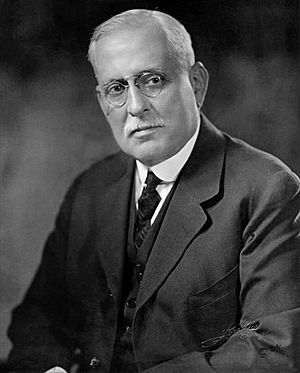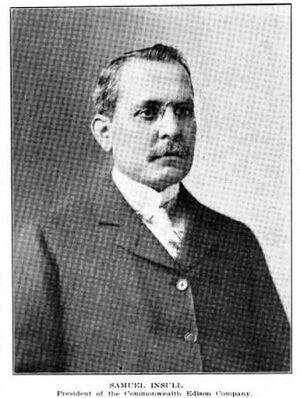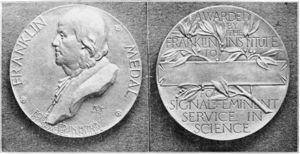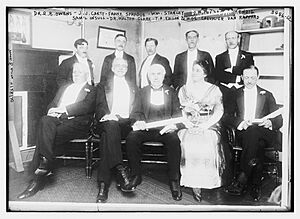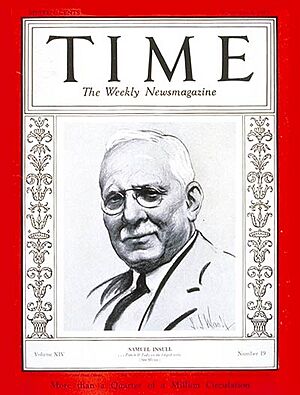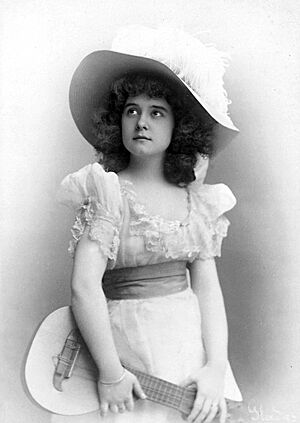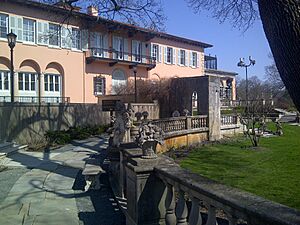Samuel Insull facts for kids
Samuel Insull (born November 11, 1859 – died July 16, 1938) was an important businessman. He was born in England but became an American citizen. He lived in Chicago and helped build the way electricity was delivered across the United States.
Insull created large companies that bought up many smaller ones. These included power companies and railroads. He also helped build the famous Chicago Civic Opera House in 1929. Later, during a very difficult time called the Great Depression, his large group of companies faced big problems and collapsed. He was accused of some wrongdoings, but after a trial, he was found not guilty of all charges.
Contents
Early Life and Moving to America
Samuel Insull was born in London, England, on November 11, 1859. His father was a tradesman and a preacher. Samuel was one of five children who grew up. His younger brother, Martin, also became a leader in Samuel's companies.
Samuel started working at age 14 as an office helper for different businesses. He later became a secretary for Vanity Fair magazine. When he was 19, he saw a newspaper ad and became the personal secretary for Colonel George Gouraud. Gouraud represented Thomas Edison's telephone companies in London. When Insull heard about a job with Edison in the United States, he said he would take it if he could be Edison's personal secretary.
In 1881, at 21, Insull moved to the United States. To look older, he grew side whiskers! For the next ten years, Insull took on more and more important jobs in Edison's businesses. He helped build electric power stations all over the country. In 1889, he helped start Edison General Electric, which later became General Electric.
In 1892, Insull was offered a high position at General Electric. However, he wanted to be the president, and someone else got the job. So, Insull moved to Chicago to lead the Chicago Edison Company. He also faced some disagreements when a new, bigger company was formed. Moving to Chicago seemed like a good idea for a fresh start.
Life in Chicago and Building an Empire
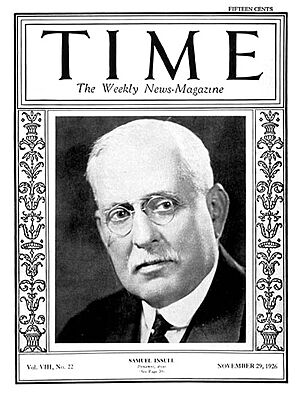
The Western Edison Light Co. started in Chicago in 1882. In 1887, it became the Chicago Edison Co. When Insull took over in 1892, the company was losing money. During a trip to England in 1894, he found a way to make it profitable. He saw that shops in England kept their lights on even when closed. He learned that they used a special billing system. This system charged different rates for electricity depending on when it was used. By 1897, Insull used this idea in Chicago. Many homeowners found their electricity bills went down by 32% in just one year!
In 1896, Insull became a US citizen. In 1897, he started another electric company. In 1907, his two companies officially joined to form the Commonwealth Edison Co.
As more people started using electricity, Insull's company grew very quickly. By 1920, it had 6,000 employees and served about 500,000 customers. The company's yearly earnings were almost $40 million.
Insull started buying parts of the city's power system. He also switched his support to alternating current (AC) power. This was a big change from Edison's direct current (DC) power, but AC proved to be better for sending electricity over long distances.
His companies in the Chicago area grew to include Commonwealth Edison, Peoples Gas, and the Northern Indiana Public Service Company. He also owned parts of many railroads, especially electric train lines. He helped make these railroads more modern.
Insull believed that electric companies should be regulated by the government. He thought that these companies were "natural monopolies." This meant they could grow without much competition and provide electricity to many people. He used large steam turbines to produce electricity cheaply. This made it easier to bring electricity into homes.
Samuel Insull was also interested in radio. He thought that radio could bring opera performances to people's homes. He worked with Westinghouse to build a radio station in Chicago. This station, KYW, started broadcasting on November 11, 1921. It was Chicago's first radio station!
Even after his partnership with Westinghouse ended, Insull continued his interest in broadcasting. He bought other radio stations and moved them into his Civic Opera House. He even started a mechanical television station in 1929.
Personal Life
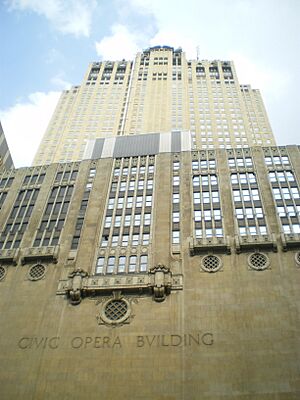
On May 22, 1899, Samuel Insull married Gladys Wallis. She was a popular actress on Broadway. Her real name was Margaret Anna Bird. Gladys was known for being "tiny, beautiful, and clever." She had been acting since she was a child.
When they married, Insull was 41 and Gladys was 24. The Insulls lived in a large home in Vernon Hills, outside Chicago. They also had an apartment in the city and a special suite at the Civic Opera House. They had one son, Samuel Jr.
Both Samuel and Gladys loved the arts. Because of this, Insull was very important in building Chicago's Civic Opera House. It opened on November 4, 1929. Insull also gave a lot of money to hospitals and charities, especially those helping African-American communities in Chicago. During World War I, President Woodrow Wilson asked Insull to lead the Illinois Defense Council. His efforts helped sell over a million dollars in War Bonds.
The Great Depression and Later Life
The Wall Street Crash of 1929 and the Great Depression caused Insull's large group of companies to collapse. His companies were built on a lot of borrowed money. This collapse caused many people, about 600,000 shareholders, to lose their life savings. This event led to new laws being created to regulate utility companies.
After his companies failed, Insull left the country. He first went to France, then to Greece, and later to Turkey. In 1934, he was arrested in Turkey and sent back to the United States. He faced charges related to his business dealings. However, after a trial, he was found not guilty of all charges.
In July 1938, the Insulls were visiting Paris, France. Samuel Insull had a heart problem. His wife had asked him not to use the subway because it was bad for his heart. However, Insull often said he was "now a poor man." On July 16, 1938, he walked down a long flight of stairs at a subway station. He died there from a heart attack. He had only 30 francs (about 84 cents) in his pocket. He was identified by a hotel laundry bill. Samuel Insull was buried near his parents in Putney Vale Cemetery, London.
Legacy
Samuel Insull left behind important ideas and systems. He helped create the modern electricity grid systems we use today. He also supported the idea of "regulated monopolies" for utility companies. This means that one company provides a service, like electricity, but its prices and services are watched over by the government to ensure fairness. Insull believed that having one company was more efficient than many competing ones. He also thought that citizens deserved fair prices. So, he bought up rival companies to create a monopoly, but he also kept prices low and pushed for government regulation.
In Media
The famous movie Citizen Kane (1941) was partly inspired by Samuel Insull's life. The film's director, Orson Welles, said that a real person built an opera house for a singer he liked, and much of that story was used in the movie. Welles even used a photo of Insull as a model for how the older main character, Charles Foster Kane, should look.
Tom Holland plays Samuel Insull in the 2019 historical drama film The Current War.
|
See also
 In Spanish: Samuel Insull para niños
In Spanish: Samuel Insull para niños
- List of people on the cover of Time Magazine: 1920s, 29 November 1926
 | Precious Adams |
 | Lauren Anderson |
 | Janet Collins |


